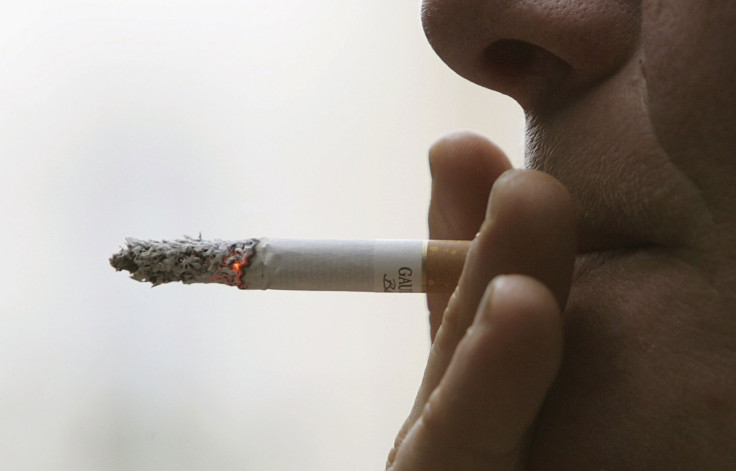Truth Campaign: Tobacco Companies Targeted Military Members, Mental Health Patients

Tobacco companies have targeted those with mental health conditions and people in the military, according to a new truth campaign.
We’ve all seen commercials on TV made by Truth initiative, including the one about cats dying over second-hand smoking, #CATmageddon. The Truth initiative works to alert people about the dangers of smoking, and are out with a new campaign this month which focuses on those with mental health conditions and people in the military.
While teen smoking of traditional cigarettes have gone down, tobacco is still the number one cause of preventable death in the United States. Smoking has now concentrated on certain demographics, including people in the military and those with mental health disorders, Truth Initiative’s COO Dave Dobbins told International Business Times.
People with mental health conditions, like depressions and ADHD, and those with substance use disorders make up 40 percent of the total cigarettes smoked in the United States. Meanwhile, 38 percent of smokers in the military start use of cigarettes after they enlist. The organization says tobacco companies have exploited these groups, just like they have targeted people in low-income communities, African-Americans and LGBTQ individuals.
“More and more we’re seeing it concentrated in different areas,” said Dobbins about smoking addiction. “Now it depends on where you live, who you love.”
Tobacco Use Among People With Mental Health Conditions
About 33 percent of adults with mental health conditions smoke, compared to 20 percent of people without mental health disorders, the organization found. Those with serious mental health conditions are more likely to smoke. Smoking can can lead to cancer, lung disease and cardiovascular disease, and because of those risks people with mental health conditions die about five years earlier than those without.
The Truth initiative found Big Tobacco has given away free cigarettes to psychiatric facilities.
“Rules used to be a lot looser across the board,” Dobbins pointed out. “Tobacco sponsored science that said nicotine helped relieve people.”
For a long time, tobacco companies “promoted” to the mental health community the idea that tobacco helped them out.
“The tobacco companies funded research, supported conferences and funded authors to generate and promulgate the message that smoking a cigarette can relieve symptoms of schizophrenia, depression and anxiety,” Dr. Judith Prochaska, associate professor of medicine at the Stanford Prevention Research Center said in a statement.
However, research shows people that are recovering from depression or mood disorders are less symptomatic if they stop smoking.
“The evidence is clear that quitting smoking does not harm, and may even improve, mental health recovery,” said Prochaska.
Tobaccos Use In The Military
Smoking rates are higher among military service men compared to the general population. In 2011, about 24 percent of active-duty military personnel said they currently smoked, compared to 19 percent of the general population who said the same that year.
truth looked at documents in lawsuits and found major tobacco companies saw people in the military as an attractive marketing opportunity, describing young adult servicemen as “classic downscale smoker,” “less educated,” “part of the wrong crowd,” “in trouble with authorities” and having “limited job prospects.
The organization found tobacco companies gave cigarettes away for free cigarettes to U.S. military personnel.
“They sponsored lots of entertainment for troops on the military bases, giving away cigarettes,” Dr. Libby Smith, professor at the University of California, San Francisco, said in a statement. “This seemed like a gift to the troops, but really it’s all about just marketing the product.”
Dobbins said he doesn’t think companies give away cigarettes anymore.
“You have to remember until the late 90s, the tobacco industry vehemently denied smoking was dangerous,” Dobbins told IBTimes. “[They] took an oath and swore to Congress tobacco wasn't addictive. Recently they acknowledged facts they’ve known for a very long time.”
However, those in the military may still get discounts.
Did tobacco industry profiling lead to 38% of military smokers starting after they enlisted? https://t.co/LyEecIN3bo pic.twitter.com/REFIUaRrgs
— Truth Initiative (@truthinitiative) August 21, 2017
Smith pointed out smoking could impact health, even in the short term.
“While military personnel are supposed to be at peak fitness, tobacco use damages respiratory health and cardiac fitness, even in the short term,” said Smith. “Smoking also impairs night vision and retards wound healing, both of which are important for our military members.”
The U.S. Department of Defense spends more than $1.6 billion a year on tobacco-related health care, increased hospitalization and lost days of work. Meanwhile, the Veterans Health Administration spends $2.7 billion on health care costs related to cigarettes.
The new campaign, titled “Business or Exploitation?”, is set to debut during the 2017 MTV Video Music Awards this week.
“One thing we can do is educate people,” said Dobbins. “That’ what this is about. When they understand they’re a target they tend to resist.”
© Copyright IBTimes 2024. All rights reserved.



















